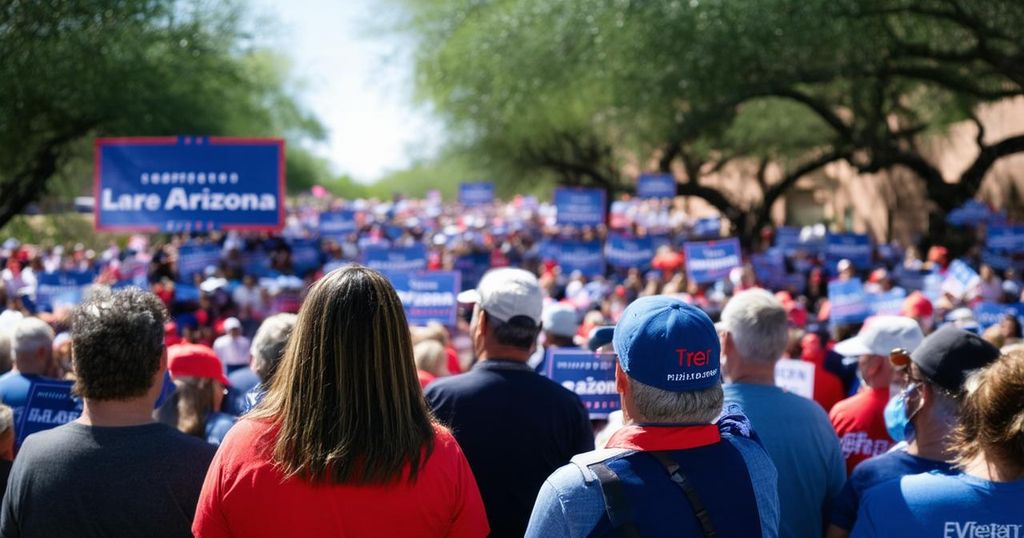Political Showdown: Trump Emerges in Arizona Amidst Harris and Obama Rallying in Georgia

As the election nears, Donald Trump heads to Arizona while Kamala Harris and Barack Obama rally in Georgia, with Bruce Springsteen joining Harris. Trump misidentifies Obama in a discussion about the Middle East. Amidst reports of alarming security incidents, political tensions rise as Harris criticizes Trump’s controversial comments, with ongoing debates about the implications of his rhetoric. The conflict in Gaza further complicates Harris’s stance as the article highlights the charged political atmosphere.
In the upcoming electoral stretch, Donald Trump heads to Arizona while Vice President Kamala Harris and former President Barack Obama campaign for Democratic candidates in Georgia. Notably, musician Bruce Springsteen will join Harris in Atlanta as the election approaches, amid a fiercely competitive landscape indicated by recent polling data. A campaign clip features Trump erroneously attributing the handling of the Middle East crisis to former president Obama, prompting a correction from the Fox News host during the discussion. This incident highlights ongoing concerns regarding Trump’s awareness of current leadership, as the Harris campaign pointedly noted, “Trump confuses who is currently president.” President Biden has recently withdrawn from the race due to concerns about his age and a lackluster debate performance. Meanwhile, the Harris campaign has seized on instances of Trump’s verbal blunders as a strike against his credibility, suggesting they reflect inadequacies tied to his gaffe-prone age. Trump’s running mate is scheduled to rally in Waterford, Michigan, a critical battleground where recent polls suggest a competitive match between Trump and Harris. The Republican nominee, during a visit to the Detroit area, acknowledged the endorsement of Hamtramck’s Yemeni-American mayor. In a pointed critique, Harris condemned Trump over comments attributed to him that, while defending himself, by implying that Hitler had some positive attributes. She labeled him “unhinged and unstable” based on such rhetoric. Moreover, Trump has stated that, should he win the upcoming election, he would dismiss Special Counsel Jack Smith, who is investigating him for allegedly attempting to annul the 2020 election results. Trump expressed eagerness to act swiftly by declaring, “I would fire him within two seconds.” In a troubling security development, a suburban Phoenix man was arrested for allegedly targeting the DNC office with gunfire, possessing a significant arsenal that raised alarm over possible violence. Congressman Eli Crane criticized Harris for labeling Trump a fascist, highlighting the purported danger of incendiary language. This has reignited a broader national debate surrounding Trump’s political style and its implications. Political commentators have mulled whether Trump embodies fascist traits in light of recent remarks by former General John Kelly, who asserted, “He commented more than once that, ‘You know, Hitler did some good things, too.’” As Harris underscores her policy objectives concerning the conflict in Gaza, calling for a nuanced approach that includes security and dignity for Palestinian people, Israeli Prime Minister Benjamin Netanyahu has dismissed calls for a ceasefire, insisting on relentless military action. In the midst of this political maelstrom, the candidates continue to address pressing issues that resonate deeply with voters, signaling a turbulent campaign season ahead.
The article centers on the current political climate, particularly focusing on the competitive dynamics between Republican candidate Donald Trump and Democratic candidates, including Vice President Kamala Harris and former President Barack Obama. It highlights key campaign events, noteworthy statements from the candidates, and explores underlying tensions surrounding Trump’s controversial remarks and broader concerns regarding political rhetoric within the United States. Furthermore, the discourse touches on significant issues including Trump’s legal challenges and the ongoing conflict in Gaza, positioning these topics as pivotal elements in the upcoming elections.
In summary, the unfolding electoral landscape features intensified campaigning from both major parties, with candidates distinctly outlining their positions and confronting each other’s past remarks and actions. The narrative encapsulates a climate of heightened scrutiny, where candidates’ statements—a potent mix of policy and personal rhetoric—will undoubtedly shape public perception and voter sentiment leading up to the elections.
Original Source: www.aljazeera.com








